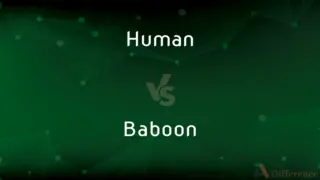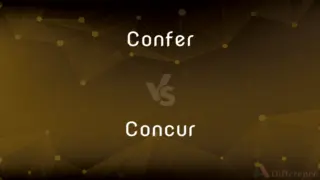Span vs. Duration — What's the Difference?
By Tayyaba Rehman — Updated on September 14, 2023
Span refers to the full extent of something, often time or distance, while duration is the specific time during which something lasts or continues.

Difference Between Span and Duration
Table of Contents
ADVERTISEMENT
Key Differences
Span and Duration are words frequently associated with time, but they have nuances in their meanings. Span indicates the entire range or extent of an interval, whether time or even distance. Duration, however, zeroes in on the length of time an event or situation lasts.
Consider the span of a person's life, which would encompass birth to death. In contrast, the duration of a person's education might only reference the years they spend in school. Both terms measure time, but the contexts differ.
Span can also relate to physical distances or scopes, such as the span of a bridge. Duration remains confined to time, addressing how long something persists, like the duration of a concert or meeting.
Both words often appear in discussions about projects or events. The span of a project could cover its inception to completion, while its duration would be the actual time taken to complete it.
In essence, while both span and duration can discuss intervals, span has a broader application, whereas duration is specifically about the passage of time.
ADVERTISEMENT
Comparison Chart
Definition
Extent of something
Time during which something lasts
Usage
Can be related to both time and physical distance
Strictly related to time
Contexts
Broader application
Specific to time-based events or situations
Example
Span of a bridge
Duration of a movie
Flexibility
Can be used for distances or timeframes
Limited to time intervals
Compare with Definitions
Span
The length of time for which something lasts.
Her career span was 40 years.
Duration
The time during which something continues.
The duration of the flight was 5 hours.
Span
To bridge or link different areas.
His skills span both marketing and sales.
Duration
The continuation of time.
He stayed for the duration of the seminar.
Span
The extent or measure of space between two points or extremities, as of a bridge or roof; the breadth.
Duration
The length of time something lasts.
The medicine's effects have a short duration.
Span
The distance between the tips of the wings of an airplane.
Duration
Continuance or persistence in time.
Span
The section between two abutments or piers of a bridge.
Duration
A period of existence or persistence
Sat quietly through the duration of the speech.
Span
Something, such as a railroad trestle or bridge, that extends from one point to another.
Duration
The number of years required to receive the present value of future payments, both of interest and principle, of a bond, often used as an indicator of a bond's price volatility resulting from changes in interest rates.
Span
The distance from the tip of the thumb to the tip of the little finger when the hand is fully extended, formerly used as a unit of measure equal to about 9 inches (23 centimeters).
Duration
An amount of time or a particular time interval.
The duration of the flight will be about 2 hours 45 minutes.
She was moaning for the entire duration of the advert break.
Span
A period of time
A span of life.
Duration
(in the singular, not followed by "of") The time taken for the current situation to end, especially the current war
Rationing will last at least for the duration.
Span
(Nautical) A stretch of rope made fast at either end.
Duration
(finance) A measure of the sensitivity of the price of a financial asset to changes in interest rates, computed for a simple bond as a weighted average of the maturities of the interest and principal payments associated with it.
Span
A pair of animals, such as oxen, matched as in size or color and driven as a team.
Duration
The state or quality of lasting; continuance in time; the portion of time during which anything exists.
It was proposed that the duration of Parliament should be limited.
Soon shall have passed our own human duration.
Span
To extend across in space or time
A bridge that spans the gorge.
A career that spanned 40 years.
Duration
The period of time during which something continues
Span
To encircle or cover with the hand or hands.
Duration
The property of enduring or continuing in time
Span
To measure in spans.
Duration
Continuance in time;
The ceremony was of short duration
He complained about the length of time required
Span
A past tense of spin.
Duration
A specific span of time.
The contract has a duration of two years.
Span
The full width of an open hand from the end of the thumb to the end of the little finger used as an informal unit of length.
Duration
Persistence over a period.
The duration of his stay was indefinite.
Span
Any of various traditional units of length approximating this distance, especially the English handspan of 9 inches forming ⅛ fathom and equivalent to 22.86 cm.
Span
(by extension) A small space or a brief portion of time.
He has a short attention span and gets bored within minutes.
Span
A portion of something by length; a subsequence.
Span
The spread or extent of an arch or between its abutments, or of a beam, girder, truss, roof, bridge, or the like, between supports.
Span
The length of a cable, wire, rope, chain between two consecutive supports.
Span
(nautical) A rope having its ends made fast so that a purchase can be hooked to the bight; also, a rope made fast in the center so that both ends can be used.
Span
A pair of horses or other animals driven together; usually, such a pair of horses when similar in color, form, and action.
Span
(mathematics) The space of all linear combinations of something.
Span
(computing) The time required to execute a parallel algorithm on an infinite number of processors, i.e. the shortest distance across a directed acyclic graph representing the computation steps.
Span
Wingspan of a plane or bird
Span
(transitive) To extend through the distance between or across.
The suspension bridge spanned the canyon.
Span
(transitive) To extend through (a time period).
The parking lot spans three acres.
The novel spans three centuries.
Span
(transitive) To measure by the span of the hand with the fingers extended, or with the fingers encompassing the object.
To span a space or distance; to span a cylinder
Span
(mathematics) To generate an entire space by means of linear combinations.
Span
To be matched, as horses.
Span
(transitive) To fetter, as a horse; to hobble.
Span
The space from the thumb to the end of the little finger when extended; nine inches; eighth of a fathom.
Span
Hence, a small space or a brief portion of time.
Yet not to earth's contracted spanThy goodness let me bound.
Life's but a span; I'll every inch enjoy.
Span
The spread or extent of an arch between its abutments, or of a beam, girder, truss, roof, bridge, or the like, between its supports.
Span
A rope having its ends made fast so that a purchase can be hooked to the bight; also, a rope made fast in the center so that both ends can be used.
Span
A pair of horses or other animals driven together; usually, such a pair of horses when similar in color, form, and action.
Span
To measure by the span of the hand with the fingers extended, or with the fingers encompassing the object; as, to span a space or distance; to span a cylinder.
My right hand hath spanned the heavens.
Span
To reach from one side of to the order; to stretch over as an arch.
The rivers were spanned by arches of solid masonry.
Span
To fetter, as a horse; to hobble.
Span
To be matched, as horses.
Span
The complete duration of something;
The job was finished in the span of an hour
Span
The distance or interval between two points
Span
Two items of the same kind
Span
A unit of length based on the width of the expanded human hand (usually taken as 9 inches)
Span
A structure that allows people or vehicles to cross an obstacle such as a river or canal or railway etc.
Span
The act of sitting or standing astride
Span
To cover or extend over an area or time period;
Rivers traverse the valley floor
The parking lot spans 3 acres
The novel spans three centuries
Span
The full extent of something from end to end.
The span of the bridge was impressive.
Span
To stretch or extend over.
The topic spans several chapters in the book.
Span
A section or division of a journey or process.
He completed the first span of his trip.
Common Curiosities
What does Span mean?
Span indicates the full extent or range of something.
Can Span refer to physical distances?
Yes, like the span of a bridge or arch.
Is Duration only about time?
Yes, it addresses how long something lasts or continues.
What's an example of Span relating to time?
The span of a person's life, from birth to death.
How would you describe the Duration of an event?
The time from the event's start to its end.
How does Duration differ from Span?
Duration specifies the time something lasts, while span can also relate to physical distances.
Is Span more flexible than Duration in usage?
Yes, span can be used for time and physical distances, while duration is time-specific.
Can Span relate to subjects or topics?
Yes, like a topic spanning several chapters.
Why is Duration important in events or projects?
It helps in planning and managing the time efficiently.
What's a synonym for Duration?
Continuance or length.
Can something have a brief Duration?
Yes, like the short duration of a sprint.
Does Duration always refer to long periods?
No, it can describe short or long intervals.
Is the Span of a journey its entire length?
It can be, or it can refer to sections of the journey.
Can Duration refer to future events?
Yes, like the duration of an upcoming seminar.
How do you use Span in a sentence?
"The span of the book covers several decades."
Share Your Discovery

Previous Comparison
Human vs. Baboon
Next Comparison
Confer vs. ConcurAuthor Spotlight
Written by
Tayyaba RehmanTayyaba Rehman is a distinguished writer, currently serving as a primary contributor to askdifference.com. As a researcher in semantics and etymology, Tayyaba's passion for the complexity of languages and their distinctions has found a perfect home on the platform. Tayyaba delves into the intricacies of language, distinguishing between commonly confused words and phrases, thereby providing clarity for readers worldwide.












































